If you’re looking to ignite your business journey, I recommend exploring the 15 top entrepreneurship audiobooks that cover everything from strategic planning and financial management to leadership and innovation. These books offer practical frameworks like Profit First for cash flow, Zero to One for creating disruptive startups, and BE 2.0 for building lasting companies. By embracing these insights, you’ll gain powerful tools for growth and success—if you keep going, you’ll uncover even more ways to transform your approach.
Key Takeaways
- These audiobooks offer practical frameworks like Profit First, Disciplined Entrepreneurship, and 12 Months to $1 Million to accelerate business growth.
- They emphasize strategic thinking, innovation, and foundational decisions essential for building disruptive and sustainable startups.
- Leadership and culture-building principles from books like BE 2.0 foster resilient organizations with long-term success.
- Personal growth and mindset shifts, highlighted in titles like Unscripted, empower entrepreneurs to overcome mental barriers and pursue purpose-driven success.
- The audiobooks combine actionable insights and real-world examples, making them ideal for entrepreneurs seeking practical, inspiring guidance.
Profit First Book: Transform Your Business
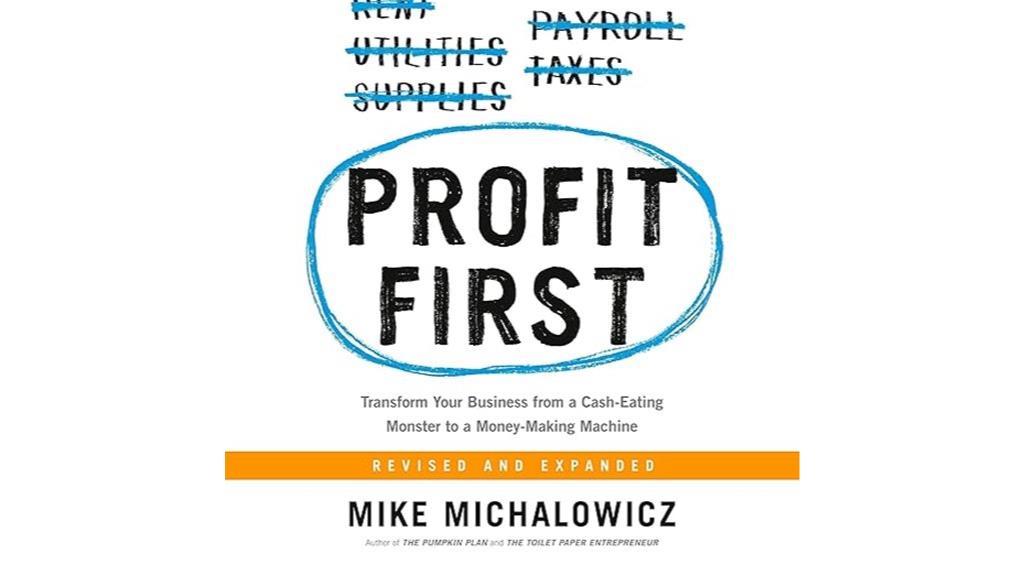
If you’re a small business owner or entrepreneur struggling to manage cash flow and turn a consistent profit, Profit First by Mike Michalowicz is a game-changer. This book flips traditional accounting on its head by urging you to prioritize profit before expenses. It encourages you to pay yourself first, build financial discipline, and change your mindset about money. The system is straightforward—setting up multiple bank accounts to allocate funds intentionally. Implementing it can help you see real cash flow, reduce stress, and achieve sustainable profitability. It’s a practical, impactful approach that transforms how you think about and manage your business finances.
Best For: small business owners and entrepreneurs seeking a straightforward, effective method to improve cash flow, increase profitability, and build financial discipline.
Pros:
- Simple and easy-to-implement system with clear steps and actionable guidance
- Promotes sustainable profitability by prioritizing profit before expenses
- Helps reduce financial stress and improve cash flow management
Cons:
- May require an initial setup of multiple bank accounts, which could be inconvenient for some
- Some users might find the shift in mindset challenging to adopt at first
- The focus on cash flow may overlook other complex financial factors specific to certain industries
Your Next Five Moves: Master the Art of Business Strategy

Your Next Five Moves is a must-have for entrepreneurs and business leaders who want to think several steps ahead and outmaneuver their competition. Patrick Bet-David emphasizes that mastering business strategy starts with the right mindset and self-awareness. He encourages critical thinking, studying philosophy, and understanding personal motivations to stay motivated and disciplined. The book advocates structured decision-making, strategic positioning, and controlling environments to gain leverage. Building high-performing teams and understanding power dynamics are key to sustained success. Practical tools like lists, frameworks, and self-assessment keep you continuously improving. Overall, it’s about thinking ahead, positioning yourself wisely, and acting intentionally to dominate your business landscape.
Best For: entrepreneurs, business leaders, and strategists seeking to develop forward-thinking skills and master competitive positioning.
Pros:
- Encourages critical thinking and self-awareness to improve decision-making skills.
- Provides practical frameworks and tools to implement strategic planning effectively.
- Emphasizes the importance of building strong teams and understanding human dynamics for sustained success.
Cons:
- Requires dedication to studying philosophy and self-assessment, which may be time-consuming.
- The strategic concepts may seem complex or overwhelming for beginners without prior experience.
- Focus on high-level strategy might overlook the importance of day-to-day operational details.
BE 2.0 Book: Turning Your Business into a Great Company
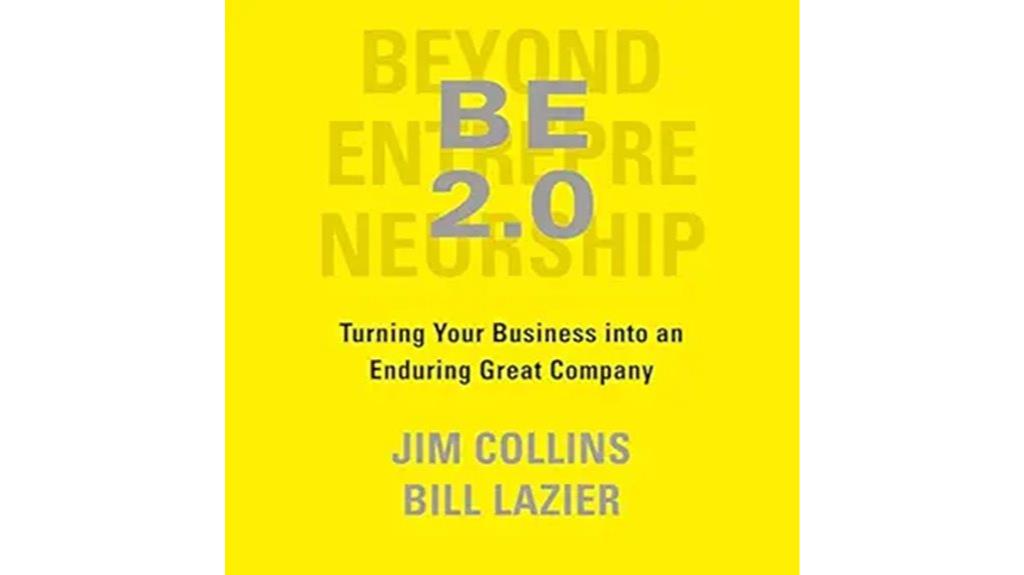
The BE 2.0 book is a must-read for aspiring entrepreneurs and current leaders who want to transform their businesses into enduring, purpose-driven organizations. I found it incredibly insightful, blending timeless leadership principles with practical tools for real-world application. Collins emphasizes the importance of character, vision, and disciplined action over strategy alone, which truly shifted my thinking. The frameworks like Level-5 Leadership, BHAGs, and the Flywheel provide a clear map for building sustainable greatness. It’s a compelling reminder that lasting success depends on culture, talent, and relentless focus, not just quick wins. This book is essential for anyone committed to creating a meaningful, resilient company.
Best For: aspiring entrepreneurs, current business leaders, and managers seeking to build enduring, purpose-driven organizations grounded in timeless leadership principles.
Pros:
- Provides a clear framework for building sustainable greatness using proven concepts like Level-5 Leadership and the Flywheel.
- Emphasizes character, vision, disciplined action, and culture, fostering integrity and long-term success.
- Combines timeless principles with practical tools and storytelling, making complex ideas accessible and actionable.
Cons:
- Some readers may find the focus on internal discipline and core values less immediately applicable to rapid-growth or startup environments.
- The book’s emphasis on long-term frameworks may seem less relevant for those seeking quick wins or short-term results.
- At times, reliance on case studies and abstract concepts could feel theoretical without concrete step-by-step instructions.
Zero to One: Notes on Startups, or How to Build the Future

Entrepreneurs seeking practical, strategic insights to build innovative startups will find “Zero to One” particularly valuable. Thiel emphasizes that success isn’t about copying formulas but thinking from first principles, encouraging boldness and calculated risk-taking. He highlights the importance of creating monopolistic niches, not competing in crowded markets, and stresses that great distribution and persuasion are crucial to a product’s success. Thiel also advises choosing co-founders carefully, as early decisions shape long-term outcomes. Challenging conventional wisdom, he advocates for strategic planning over luck, emphasizing that progress results from deliberate, foundational choices. This book is a must-listen for anyone aiming to build the future.
Best For: entrepreneurs, startup founders, and innovators seeking practical, strategic guidance to build disruptive, monopolistic businesses from first principles.
Pros:
- Provides clear, actionable insights rooted in real-world examples and strategic fundamentals.
- Emphasizes the importance of boldness, innovation, and careful foundational decisions over reliance on luck.
- Challenges conventional wisdom and offers a fresh perspective on competition, market creation, and distribution.
Cons:
- Some chapters offer limited new information for experienced entrepreneurs familiar with startup concepts.
- The focus on tech startups might underrepresent other industries or types of innovation.
- Certain ideas, like the emphasis on monopolies, may be controversial or misinterpreted without proper context.
Unscripted: Life, Liberty, and the Pursuit of Entrepreneurship
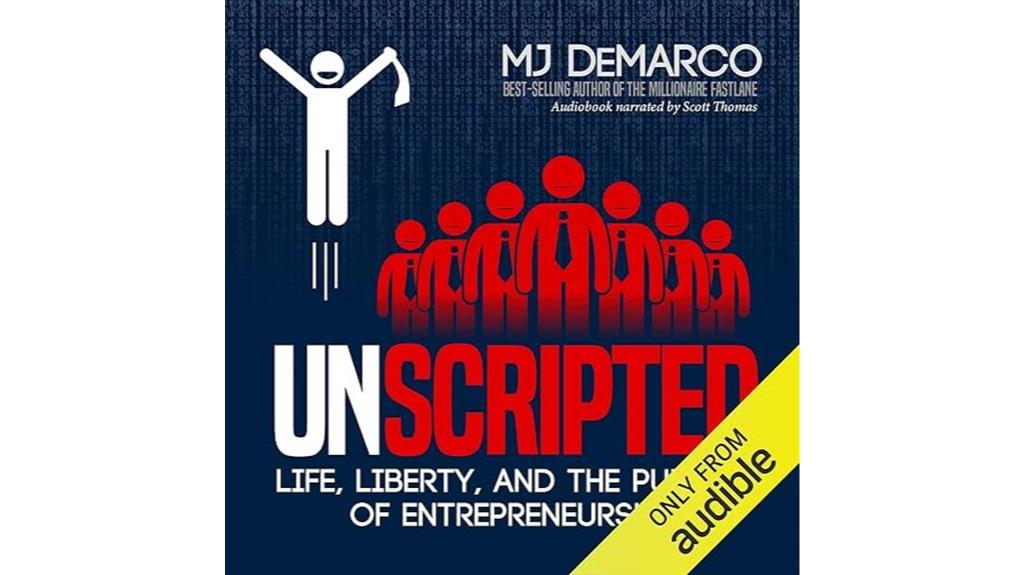
If you’re ready to challenge your beliefs and break free from societal conditioning, *Unscripted: Life, Liberty, and the Pursuit of Entrepreneurship* offers powerful insights for those enthusiastic to re-engineer their mindset. It emphasizes transforming ingrained biases about success, happiness, and fulfillment by adopting a growth mindset and questioning societal norms. The book highlights the importance of autonomy, perceiving value, and confronting mental barriers that keep you trapped in a scripted life. Success, it argues, starts with mindset, discipline, and intentional action. It provides practical frameworks and principles to shift your perspective, build wealth through value, and create a life of purpose beyond societal expectations.
Best For: individuals dissatisfied with traditional employment who seek to re-engineer their mindset, embrace entrepreneurship, and pursue financial independence and personal freedom.
Pros:
- Offers transformative insights on mindset, beliefs, and systemic thinking to foster personal growth.
- Provides practical frameworks and principles for building wealth, creating impactful businesses, and achieving lifelong passive income.
- Engages readers with humor, anecdotes, and accessible storytelling to simplify complex concepts.
Cons:
- Not a step-by-step guide; requires self-discipline and reflection for effective implementation.
- Demands a significant time investment for reflection, re-reading, and internalization of concepts.
- May challenge deeply ingrained societal beliefs, which could be uncomfortable or confrontational for some readers.
Disciplined Entrepreneurship Expanded & Updated
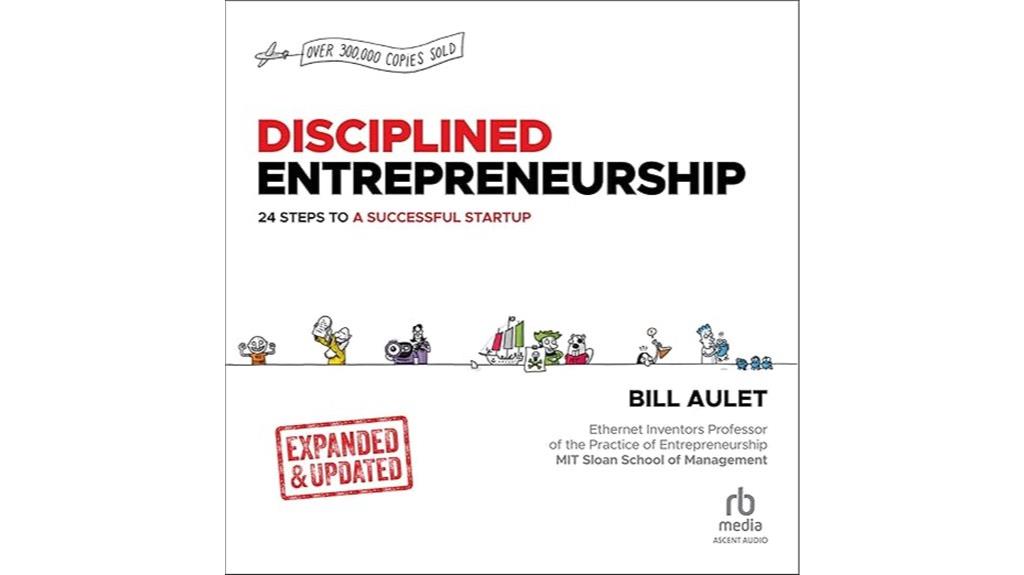
Designed for startup founders and budding entrepreneurs seeking a clear, systematic approach, “Disciplined Entrepreneurship” offers an expanded and updated framework that reflects the latest insights and practical applications. Bill Aulet’s book breaks down the complex process of building a startup into 24 manageable steps, blending strategic insights with real-world examples. The new edition adds more content, resources, and case studies, making it even more valuable. It’s been widely adopted in entrepreneurial accelerators and praised for its practical, step-by-step methodology. If you want a reliable roadmap to navigate the entrepreneurial journey with confidence, this updated guide is an essential resource.
Best For: aspiring entrepreneurs and startup founders seeking a comprehensive, step-by-step framework to build sustainable and scalable businesses with strategic depth.
Pros:
- Provides a clear, systematic approach with 24 manageable steps that guide entrepreneurs from idea to pitch.
- Combines strategic insights with practical examples, making complex concepts accessible and actionable.
- Widely adopted in entrepreneurial accelerators and praised for increasing startup success rates and avoiding common pitfalls.
Cons:
- The detailed methodology may be overwhelming for complete beginners without prior business knowledge.
- Some concepts might require additional context or experience to fully grasp and implement effectively.
- The book’s structured approach may limit flexibility for entrepreneurs seeking a more improvisational or innovative process.
The Lean Startup Book

The Lean Startup by Eric Ries is a must-listen for anyone enthusiastic to understand how to build and grow a successful business in uncertain environments. It emphasizes a test, learn, adapt mindset that applies beyond startups, encouraging validated learning through real feedback loops. The core idea is to minimize waste by deploying MVPs, measuring actionable metrics, and pivoting when necessary. Ries promotes rapid experimentation, small batch production, and continuous innovation. This approach helps founders manage extreme uncertainty, reduce risk, and make smarter decisions. Whether you’re launching a startup or innovating within an organization, this book offers practical insights to foster a culture of ongoing experimentation and growth.
Best For: entrepreneurs, startups, and established organizations seeking to implement continuous innovation, validated learning, and rapid experimentation in uncertain environments.
Pros:
- Emphasizes a scientific, test-and-learn approach that reduces waste and increases adaptability
- Promotes a culture of ongoing experimentation and data-driven decision-making
- Applicable across various sectors beyond technology, including education and systems change
Cons:
- Lacks specific implementation techniques, requiring organizations to develop their own methods
- May lead to an over-reliance on testing as a crutch, delaying bold decision-making
- Implementation can be challenging across organizational silos and in larger, established companies
12 Months to $1 Million: How to Pick a Winning Product, Build a Real Business, and Become a Seven-Figure Entrepreneur

Entrepreneurs enthusiastic to turn their ideas into a million-dollar business will find “12 Months to $1 Million” an invaluable guide. Ryan Moran provides a straightforward, month-by-month roadmap that helps you focus on one stage at a time—choosing the right product, building a brand, and scaling sustainably. The book’s practical advice is easy to follow, even for beginners, emphasizing real-world application over hype. Many readers report feeling empowered to take immediate action and make significant progress toward their goals. Moran’s honest, no-nonsense style keeps you motivated and clear about what it takes to build a seven-figure business from scratch.
Best For: aspiring entrepreneurs and beginners seeking a clear, actionable roadmap to build a profitable online business within 12 months.
Pros:
- Provides a straightforward, month-by-month step-by-step guide that simplifies complex entrepreneurial concepts.
- Emphasizes practical, real-world advice that encourages immediate action and sustainable growth.
- Written in a clear, no-nonsense tone that inspires confidence and motivation for first-time and experienced entrepreneurs alike.
Cons:
- Some readers feel the book could include more detailed instructions on specific business setup procedures.
- The focus is primarily on online product-based businesses, which may limit applicability for other business models.
- As a high-level roadmap, it might require additional resources or research for comprehensive execution of each step.
Disciplined Entrepreneurship

If you’re looking for a practical, step-by-step guide to turn your business ideas into reality, “Disciplined Entrepreneurship” offers a structured framework that’s perfect for both new and experienced founders. This book breaks down complex entrepreneurial processes into clear, actionable steps—covering customer discovery, market sizing, pricing, and financial modeling—highlighting dependencies rather than skills. It helps you identify gaps, refine your efforts, and navigate the journey with confidence. The framework is rooted in real-world experience, making it a valuable tool to organize your thinking, reduce waste, and increase your chances of success in any entrepreneurial venture.
Best For: aspiring and experienced entrepreneurs seeking a clear, structured approach to building, validating, and refining their business ideas efficiently.
Pros:
- Provides a straightforward, step-by-step framework that simplifies complex entrepreneurial tasks.
- Emphasizes understanding dependencies and business physics over relying solely on founder skills.
- Based on real-world experience, making it practical and immediately applicable to startups at any stage.
Cons:
- May require adaptation for highly innovative or non-traditional business models.
- Some readers might find the focus on linear processes limiting for highly iterative or exploratory ventures.
- As a practical guide, it might oversimplify certain complexities inherent in entrepreneurial environments.
The $100 Startup Book

Anyone looking to start a profitable business with minimal upfront investment will find “The $100 Startup” by Chris Guillebeau particularly inspiring. This book shows you how ordinary people turned small ideas into sustainable income streams, often with just a hundred dollars. It offers practical checklists, tips on location independence, outsourcing, and choosing the right projects. I love how it emphasizes designing a life you love—focusing on passions rather than chasing quick riches. Filled with real success stories and lessons learned, it encourages you to think big, act boldly, and create a purpose-driven business that aligns with your dreams.
Best For: individuals seeking to start a low-cost, purpose-driven business that leverages passions and minimal initial investment to create sustainable income streams.
Pros:
- Provides practical checklists and actionable tips for launching a small business on a tight budget.
- Features inspiring real-life success stories that demonstrate the feasibility of turning ideas into income.
- Emphasizes lifestyle design and aligning work with personal passions for greater fulfillment.
Cons:
- Draws heavily on American entrepreneurial culture, which may require adaptation for other regions.
- Some concepts and strategies might not directly translate to European or Southern European economic contexts.
- Focuses primarily on digital and independent business models, potentially limiting applicability for certain industries or locales.
The Entrepreneur Roller Coaster: Why Now Is the Time to #JointheRide

“The Entrepreneur Roller Coaster” by Darren Hardy is a must-read for those ready to embrace the unpredictable yet rewarding journey of building a business. This book offers practical strategies and relatable stories, like Hardy earning $150,000 at 18 and learning from hiring mistakes. Hardy emphasizes the importance of focusing on “A” players, mastering one great book repeatedly, and understanding passions and strengths. It’s perfect for entrepreneurs at any stage, inspiring perseverance and strategic thinking. Hardy’s insights, backed by success stories and mentorship lessons, make this book a powerful tool to motivate you to join the ride now and push through challenges toward success.
Best For: aspiring and seasoned entrepreneurs seeking practical guidance, inspiration, and strategies to navigate the ups and downs of building a successful business.
Pros:
- Offers actionable exercises to identify passions and strengths for better decision-making
- Uses relatable stories and autobiographical insights to enhance credibility and motivation
- Emphasizes the importance of mastering one great book repeatedly over superficial learning
Cons:
- Some stories and lessons may be repetitive across Hardy’s materials and seminars
- The focus on continuous reading and reflection might feel time-consuming for busy entrepreneurs
- Certain concepts may require a mindset shift that takes time to implement effectively
How I Built This Book: Inspiring Entrepreneurs’ Success Stories

“How I Built This” by Guy Raz stands out as an essential read for aspiring entrepreneurs who want to dive deep into real-world success stories. The book offers concise, engaging narratives of founders behind everyday brands, highlighting their struggles, pivotal moments, and perseverance. It emphasizes that success isn’t guaranteed but comes from resilience, iteration, and learning from mistakes. Perfect for entrepreneurs, business enthusiasts, and memoir lovers, it pairs well with “Creativity Inc” to explore resilience and innovation. The stories remind us that setbacks are part of the journey and that grit, attention to detail, and persistence truly make a difference.
Best For: aspiring entrepreneurs, business enthusiasts, and memoir lovers seeking real-world, motivational stories of startup success and resilience.
Pros:
- Engaging storytelling that simplifies complex entrepreneurial concepts.
- Provides practical lessons on perseverance, iteration, and overcoming setbacks.
- Features diverse, relatable success stories from everyday brands beyond tech startups.
Cons:
- Occasional self-referential or generic content that may feel repetitive.
- Focused more on storytelling than in-depth business analysis or technical details.
- May lack comprehensive step-by-step guidance for starting a business from scratch.
The Art of Principled Entrepreneurship: Creating Enduring Value
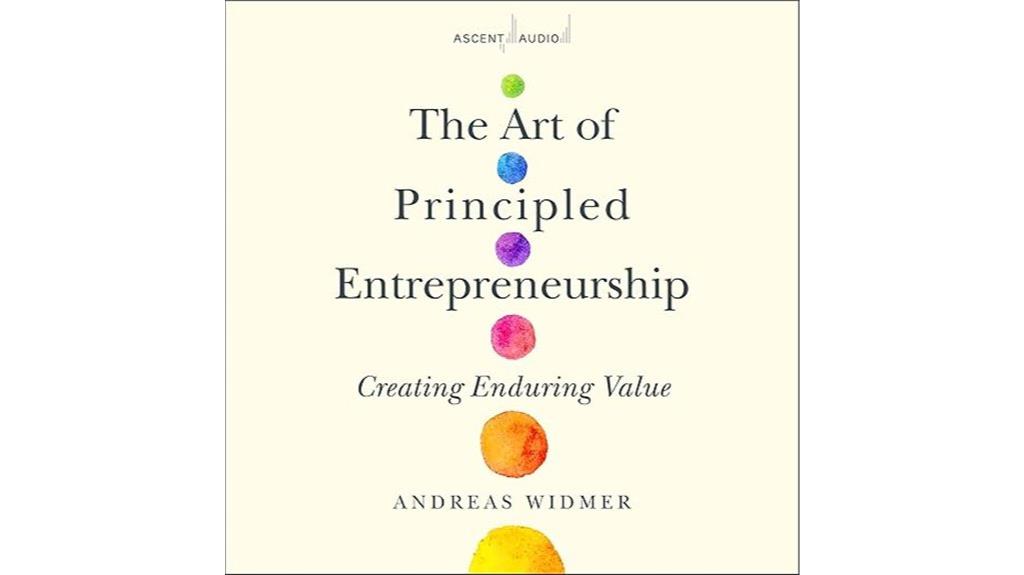
If you’re seeking an approach to entrepreneurship that prioritizes ethics and lasting impact, “The Art of Principled Entrepreneurship” offers invaluable insights. I’ve learned that successful business isn’t about war but about serving people with transparency and integrity. Widmer emphasizes that principles rooted in human dignity and long-term growth create sustainable value for all stakeholders—customers, employees, and communities. Practical stories and real-world examples make these ideas relatable and actionable. This book reminds me that meaningful, ethical leadership isn’t just good morals—it’s essential for enduring success. It challenges us to balance profit with purpose, fostering businesses that truly make a difference.
Best For: entrepreneurs, business leaders, and students seeking to build sustainable, ethical businesses rooted in human dignity and long-term value.
Pros:
- Emphasizes principles of integrity, transparency, and stakeholder well-being.
- Provides practical stories and real-world examples for relatable learning.
- Inspires ethical leadership and sustainable business practices aligned with faith-based values.
Cons:
- May require a mindset shift for those accustomed to conventional profit-driven models.
- Focus on principled entrepreneurship might seem idealistic or challenging to implement consistently.
- Primarily resonates with audiences aligned with faith-based or ethical frameworks, potentially limiting appeal for purely profit-centric audiences.
Financial Intelligence for Entrepreneurs
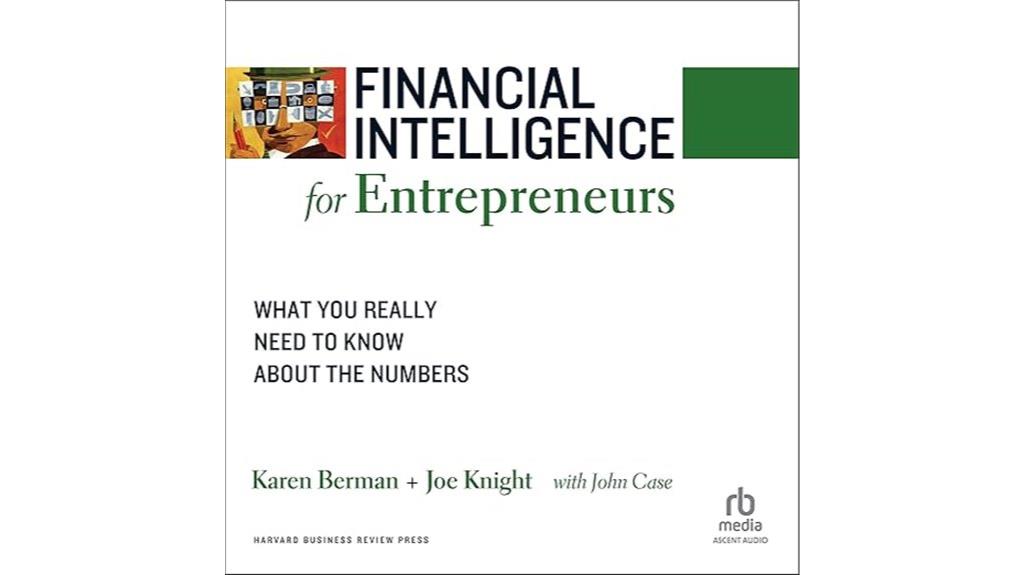
Are you a small business owner or entrepreneur without a background in finance? “Financial Intelligence for Entrepreneurs” is tailored specifically for people like you who need straightforward, practical knowledge to interpret financial statements, ratios, and key business metrics. This book breaks down complex concepts into easy-to-understand steps, focusing on strategic application rather than dense accounting jargon. It covers essential topics like managing operating capital, evaluating financial health, and analyzing your business with real-world examples and spreadsheet tools. With this resource, you’ll gain the confidence to make informed decisions, monitor your company’s financial health, and drive your venture forward with clarity.
Best For: small business owners, entrepreneurs, and professionals from non-finance backgrounds seeking practical, easy-to-understand financial literacy.
Pros:
- Clear explanations that simplify complex financial concepts.
- Practical examples and spreadsheet tools for real-world application.
- Focus on strategic use of financial data to improve business decisions.
Cons:
- Some readers find the content basic or lacking advanced financial tricks.
- The printing quality may detract from the reading experience.
- May require supplementary resources for deeper financial strategies.
Starting a Business QuickStart Guide
https://m.media-amazon.com/images/I/81FHuLVjTuL._SX522_.jpg
The Starting a Business QuickStart Guide is perfect for anyone new to entrepreneurship who wants a straightforward, step-by-step resource to launch their venture. It’s designed for aspiring entrepreneurs, students, and beginners with limited business skills, offering clarity and confidence to start small, low-capital businesses like online micro ventures. Organized into five clear sections, it breaks down each part of a business plan, making complex ideas accessible and actionable. The guide’s practical approach, supported by digital tools, helps readers understand essential concepts, plan effectively, and take confident steps forward. Authored by an experienced professor, it’s highly praised for its logical flow and all-encompassing coverage.
Best For: aspiring entrepreneurs, students, and beginners seeking a clear, practical guide to launching small, low-capital businesses with confidence.
Pros:
- Simplifies complex business concepts into easy-to-understand steps.
- Organized into five clear sections that facilitate structured planning.
- Supported by digital tools and resources to enhance practical application.
Cons:
- May lack in-depth coverage for more advanced or niche business topics.
- Designed primarily for small or online micro ventures, less suitable for larger enterprises.
- Some readers may desire more detailed financial or marketing strategies.
Factors to Consider When Choosing Entrepreneurship Audiobooks

When selecting entrepreneurship audiobooks, I focus on how well they align with my goals and the expertise of the author. I also consider how practical the tips are and whether the story keeps me engaged. Finally, I pay attention to the length to make certain I can finish it without feeling overwhelmed.
Relevance to Goals
How do you guarantee that an entrepreneurship audiobook truly supports your goals? First, verify the content aligns with your specific objectives, whether you’re launching a startup, scaling, or refining financial skills. Choose audiobooks that emphasize the areas you’re enthusiastic to develop, like marketing, operational efficiency, or strategic thinking. It’s also essential to consider the relevance of case studies and examples—do they relate to your industry or business model? Additionally, select audiobooks that match your current stage in business—whether you’re just starting or expanding. Finally, opt for those reflecting recent trends and challenges, so the insights stay current and applicable. When these factors align, you’re more likely to find an audiobook that genuinely propels your entrepreneurial journey.
Author Expertise
Choosing an entrepreneurship audiobook that genuinely advances your goals starts with evaluating the author’s expertise. Look for authors with a solid professional background, such as founding or leading successful startups, which shows they’ve applied their knowledge in real-world situations. Recognized authors often have a track record of consulting, teaching, or mentoring entrepreneurs, adding credibility to their insights. Their depth of knowledge should go beyond theory, offering actionable strategies rooted in actual experience. Credentials like business degrees, industry awards, or years of leadership further indicate reliability. I also check their previous publications, speaking engagements, and peer recognition to ensure their expertise matches my entrepreneurial learning needs. This careful assessment helps me choose audiobooks that are both trustworthy and truly beneficial.
Practical Application Tips
To get the most value from entrepreneurship audiobooks, I focus on selecting those that provide clear, actionable insights I can apply right away. I look for audiobooks that include practical frameworks, step-by-step processes, or checklists that help turn theory into real-world results. It’s important to choose books with relatable examples, case studies, or stories that align with my industry or stage of business, making the lessons more relevant. I also prioritize engaging, well-structured audiobooks because they boost retention and make it easier to implement what I learn. Finally, I opt for books authored by recognized experts or with positive reviews highlighting practical advice, ensuring the content is trustworthy and genuinely useful for my entrepreneurial journey.
Narrative Engagement
When selecting entrepreneurship audiobooks, the way the story is told can make a huge difference in how much I take away from it. Engaging narration—think storytelling, humor, and varied tone—keeps me interested and helps me remember key lessons. A compelling narrative that includes real-life examples and case studies makes complex ideas easier to grasp and emotionally resonate. Vocal modulation, pauses, and pacing highlight important points, making concepts stick. Well-crafted stories turn abstract principles into relatable, actionable insights that boost my motivation. Additionally, a smooth, cohesive storyline maintains my focus from start to finish, reducing distractions. Overall, narrative engagement transforms an ordinary audiobook into a powerful tool that inspires and educates, making my learning experience both enjoyable and impactful.
Length and Duration
The length and duration of an entrepreneurship audiobook play a crucial role in how effectively I can absorb its lessons. I consider the total run time to guarantee it fits into my available listening windows without feeling overwhelming. Longer audiobooks often require multiple sessions, so I check if their duration matches my stamina and schedule. Shorter titles are perfect for quick insights or when I need a motivational boost during busy days. While lengthy audiobooks tend to cover topics more thoroughly, they can also cause fatigue or reduce retention if I don’t pace myself well. Ultimately, I match the audiobook length to my learning goals—whether I want a quick overview or an in-depth exploration—so I stay engaged and maximize my understanding.
Production Quality
High production quality considerably influences how much I get out of an entrepreneurship audiobook. Clear audio, professional editing, and minimal background noise make it easier for me to focus and absorb the content. When the pacing is consistent, the tone is appropriate, and progression are smooth, my understanding and engagement improve substantially. Thoughtful use of sound effects and music can add depth without distracting, enhancing the listening experience. On the other hand, poor audio quality—static, muffled sound, or uneven volume—causes fatigue and hampers my learning. Investing in audiobooks with high production standards shows respect for the listener’s experience, keeping my attention longer and helping me retain crucial insights. Good production truly makes a difference in how effectively I learn and stay motivated.
Accessibility and Format
Choosing an entrepreneurship audiobook isn’t just about content quality; how you access it matters just as much. I always check if the audiobook comes in multiple formats like MP3, AAC, or streaming options, so I can listen on my preferred device. Adjustable playback speeds are a game-changer, helping me customize my listening and grasp concepts better. Accessibility features, such as transcripts or descriptive audio, are essential, especially if I face visual impairments or reading difficulties. I also look for platforms that support offline downloads, ensuring I can listen without internet—perfect for commutes and travel. Compatibility across devices—smartphones, tablets, smart speakers—is vital for seamless access. These factors make the listening experience smoother and more tailored to my needs.
Frequently Asked Questions
What Are the Best Audiobooks for Early-Stage Entrepreneurs?
You’re asking about great audiobooks for early-stage entrepreneurs, and I believe they can really boost your confidence and knowledge. I recommend “The Lean Startup” by Eric Ries for innovative thinking, “Start with Why” by Simon Sinek to find your purpose, and “The $100 Startup” by Chris Guillebeau for practical tips. These inspire, teach, and motivate me, and I think they’ll do the same for you on your entrepreneurial path.
How Can Audiobooks Improve Entrepreneurial Mindset and Motivation?
Audiobooks amplify awareness, ignite inspiration, and boost belief, building a better entrepreneurial mindset. I find that listening regularly fuels my focus, fosters flexibility, and fosters fearless forward-thinking. They’re portable, powerful, and packed with practical principles. Whether commuting or relaxing, audiobooks keep motivation magnified and mindset molded. They’re an essential element for entrepreneurs enthusiastic to evolve, empower, and excel in their exciting, entrepreneurial journey every day.
Are There Audiobooks Tailored for Specific Industries or Niches?
You’re wondering if there are audiobooks tailored for specific industries or niches. Absolutely! I’ve found that many entrepreneurs have tailored audiobooks that focus on their particular sector, whether it’s tech, fashion, or health. These niche-specific audiobooks provide targeted insights, strategies, and success stories relevant to your industry. They’re a fantastic way to deepen your understanding and stay motivated with content that directly relates to your business journey.
Which Audiobooks Focus on Scaling and Expanding a Business?
Imagine your business as a soaring bird, enthusiastic to spread its wings wider. I’ve listened to audiobooks like “Scaling Up” by Verne Harnish and “The Lean Startup” by Eric Ries, which act as wind beneath your wings. They teach you how to navigate growth, streamline processes, and expand confidently. If you’re ready to elevate, these stories will be your compass, guiding you through the skies of business scaling.
How Do I Choose Audiobooks That Suit My Entrepreneurial Learning Style?
Choosing audiobooks that suit my learning style starts with understanding how I absorb information best. I ask myself if I prefer storytelling, detailed analysis, or practical tips. Then, I look for reviews or sample clips to see if the narration and content resonate with me. I also consider my current business needs—whether I want motivation, strategies, or mindset shifts—and pick titles that align with those goals.
Conclusion
If you’re serious about jumpstarting your business journey, these audiobooks are a goldmine. They cover everything from strategy to financial smarts and mindset shifts. Remember, a journey of a thousand miles begins with a single step—so don’t wait for perfect conditions. Pick one that resonates, press play, and get moving. The road to success is paved with continuous learning—so why not start today?











